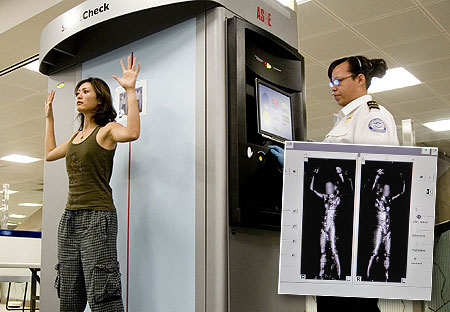Contents:
1. Summary
2. Background
3. IHRC response
4. Further information
1. Summary
The British Government introduced body scanners in Heathrow and Manchester airports on 1st of February 2010. The scanners, which see through clothes to produce an image of the body, violate Article 8 of the European Convention on Human Rights -the right to privacy. The UK government decided issue a consultation paper requesting numbers of the public to put forward their opinion on body scanners. On the 15th of July 2010 the IHRC submitted its response to the Consultation paper.
2. Background
The body scanners are a counter-terrorism initiative which has been introduced in the wake of a failed attempt by 23-year-old Nigerian Umar Farouk Abdulmutallab to blow up a US plane on 25th December 2009.
The IHRC strongly objects to the use of full body scanners. They are unethical and immoral as they show a persons private parts and the outline of the whole body.
The IHRC responded to the government’s consultation paper since the body scanners violate the civil rights of individuals. In the response, the IHRC states:
– That the UK government has failed to provide strong safeguards to prevent data from being saved, transmitted or printed as well as a comprehensive training programme to ensure security staff do not misuse the body scanners.
– That the body scanners will lead to discrimination against members of the Muslim Community since this procedure will restrict Muslims in practicing their religion and restricts their travel activities
– That the government provides insufficient safeguards to stop profiling of passengers, particularly Muslim passengers. The IHRC emphasises the fact that since the selection criteria is neither clear nor open to public scrutiny, individuals identified as being Muslim due to their dress/nationality/ethnic origin or choice of destination will be targeted.
– That the body scanners are unreliable since they will not be able to identify most types of explosives.
– The government’s initial aim of the body scanners, the war on terror, will not be achieved since alleged terrorist will use other tactics to avoid the body scanners.
3. Consultation
The Islamic Human Rights Commission (IHRC) was set up in 1997. We are an independent, not-for-profit, campaign, research and advocacy organization based in London, UK. We have consultative status with the United Nations Economic and Social Council.
The IHRC welcomes the government’s consultation paper on the code of practice for the acceptable use of advanced imaging technology in an aviation security environment.
The IHRC believes that the introduction of body scanners will lead to discrimination against members of the Muslim Community as their religious beliefs forbid them from going through the body scanners and exposing themselves through this electronic equipment. In our research we have noticed that an overwhelming majority of Muslim scholars consider this practice Islamically unlawful and since the government is refusing to consider alternatives to this procedure, this will have a tremendous impact on Muslims, not only by restricting them from taking part in daily activities, such as work that includes travelling but also restricts them in practicing their religion and is therefore discriminatory.
The IHRC believes that this issue has been deliberately clouded with hysteria and fear mongering by the government in order to enable it to further erode fundamental civil liberties as part of its ‘war on terror’.
The IHRC questions how effective these scanners will be as a counter-terrorism tool. Conservative MP, Ben Wallace, who used to work for QinetiQ, a scanning technology firm, warned that full-body scanners can be unreliable in detecting “low-density” materials like plastics, chemicals, and liquids, which is what the alleged bomber Omar Farouk Abdulmuttalab was using.
Moreover, it is quite obvious that if scanners are introduced and are as effective as it is claimed they will be, terrorists will simply change tactics or targets to avoid airport scanners. For example, the scanners are incapable of revealing explosives hidden in body cavities, which has been a traditional method for smuggling contraband. To get around body scanners, terrorists are likely to utilize such means as was the case of the suicide bomber who unsuccessfully tried to assassinate the prince responsible for counter-terrorism in Saudi Arabia in October 2009.
The IHRC objects to the following points in the consultation document:
Privacy
The IHRC finds the government’s position on privacy to be misguided. They state in the consultation that privacy is maintained as:
“…the security officer(s) conducting analysis of the image (the screener) must not be able to see the person whose image they are viewing and the security officer(s) resolving any issues identified by the body scanner should not be able to see the image of the person being searched.”
The IHRC believes that people have the right to decide who views their bodies whether in person or via images. The fact that the “screener” is unable to identify the passenger does not change the fact that he or she is viewing a near naked image of the passenger. By forcing the passenger to go through the body scanner he is being stripped of his privacy; his right to decide who takes and views images of him.
At paragraph 38 they state:
“The image produced does not show any distinguishing features such as hair or skin tone. It is not possible to recognise people from their facial features and as such, the interference with passengers’ privacy is minimised and any perceived invasion of privacy is for example far less than photographic images.”
The fact that a person’s facial features cannot be identified does not mean that the images are any less invasive. The images still show the person’s body in graphic detail where intimate piercings, catheters and all the parts of the person’s body (including those that a person would normally wish to keep private) are seen by the “screener”. This is still a gross invasion of a persons privacy (particularly for people of various religious backgrounds who believe it is a part of their religious beliefs to not reveal their bodies to others) as they are being forced to reveal their private body parts.
Below are a number of examples of images which the IHRC feels are a breach of passenger privacy:
Furthermore, due to the explicit nature of the pictures, the IHRC believes that the government will be breaching section 1 of the Protection of Children act 1978, namely the prohibition against the taking of indecent images of children.
The IHRC believes that to make the use of body scanners a routine procedure is a vicious encroachment into the sphere of civil liberties. The government has failed to show any justifiable reason to invade an individual’s privacy through the use of body scanners.
Data Protection
The IHRC is concerned by the government’s statement that:
“The machines used have no capability to save, store or print the images viewed by the screener”
since there have been independent reports that the body scanner machines do in fact have the capability to save, store or print images.
Body scanners can store, send images, group says (cnn.com)
Equally worrying are the cases of abuse reported in the media. For example:
Heathrow worker ‘ogled colleague on scanner’ (The Independent)
The IHRC is concerned by the lack of provisions dealing with staff training and supervision so as to stop abuses by those operating body scanner machines.
The IHRC believes that the government has failed to show strong safeguards to stop data from being saved, transmitted or printed as well as a robust training programme to ensure security staff do not misuse the body scanners.
Selection Criteria
The first point the IHRC wishes to note about the selection process is that paragraph 21 of the Code is particularly problematic as it does not allow passengers selected for security scanning the option to be subjected to an alternative and less intrusive form of screening. Instead, refusal to be screened will result in the passenger not being allowed to travel. If the objective of the scanners is to ensure that passengers are not concealing explosives or other contraband that would endanger the lives of others, then an alternative method of screening such as a pat down should be offered as is the case in the US and Canada.
Secondly, the IHRC finds it entirely implausible to believe that airport security officials will subject every passenger to such screening, considering the tremendous cost (around £100,000 for each machine) and time involved. So they must select certain individuals to be put through the body scanners. The consultation document states at paragraph 60:
“Passenger profiling is not part of the selection criteria.”
The IHRC feels scanning is still likely to be conducted on a selective process and which unfortunately, due to the climate of Islamophobia we live in, will mean the profiling of Muslim passengers. Although paragraph 21 of the Code prohibits the selection of passengers on a basis that may constitute discrimination such as ethnic origin, gender, age or race, it quite significantly excludes religion from these categories.
The IHRC does not believe the government has put in place sufficient safeguards to stop profiling of passengers, particularly Muslim passengers.
4. Further information
The IHRC has also written an open letter to the Minister for Transport, Phillip Hammond MP. Both Prime Minister David Cameron and Deputy Prime Minister Nick Clegg were invited to comment on the letter as well. The letter can be found at:
IHRC objects to the use of nude body scanners – Open Letter to UK government
Please also see:
ALERT: UK – Oppose Full Body Scanners at UK airports
——————————————————————————————
For more information, please contact the office on the numbers or email below
——————————————————————————————
IHRC is an NGO in Special Consultative Status with the Economic and Social Council of the United Nations.
Please help IHRC by visiting https://www.ihrc.org.uk/catalog and making a donation or buying an item from our on-line store.
If you want to subscribe to the IHRC list please send an email to subscribe@ihrc.org
If you want to unsubscribe from the IHRC list please send an email from your subscribed email address to unsubscribe@ihrc.org
If you are reusing this alert, please cite the source.
For more information, please contact the office on the numbers or email below.
“And what reason have you that you should not fight in the way of Allah and of the weak among the men and the women and the children, (of) those who say: Our Lord! Cause us to go forth from this town, whose people are oppressors, and give us from Thee a guardian and give us from Thee a helper.”
Holy Qur’an: Chapter 4, Verse 75
Join the Struggle for Justice. Join IHRC.
Islamic Human Rights Commission
PO Box 598
Wembley
HA9 7XH
United Kingdom
Telephone (+44) 20 8904 4222
Fax (+44) 20 8904 5183
Email: info@ihrc.org
Web: www.ihrc.org







